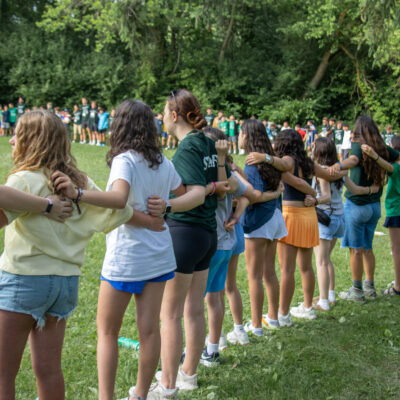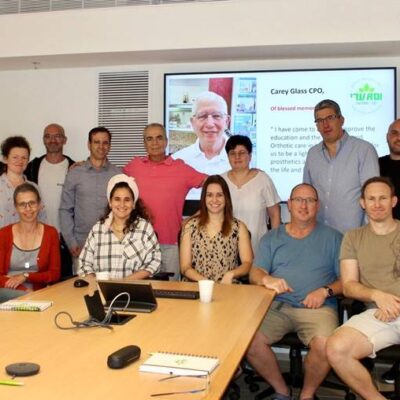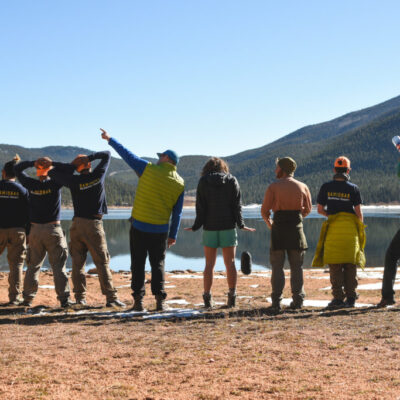Opinion
SEIZE THE OPPORTUNITY
Feeding the hunger for Jewish belonging and education
Most recent conversations in the philanthropic community are about Israel and antisemitism. Lost in these discussions is a positive and significant philanthropic opportunity arising from Oct. 7: responding to a new hunger among American Jews for participating in Jewish communal life and learning more about their Jewish heritage.
The data is overwhelming. Prizmah: The Center for Jewish Day Schools surveyed 110 schools and reported that 4 in 10 day schools have received enrollment inquiries from public school or independent school families since Oct. 7. NCSY, which offers Jewish learning clubs at public and private independent schools, experienced a significant increase in participation in their clubs as well as requests to open 70 new clubs for next year. NCSY Director Rabbi Micah Greenland also mentioned to me that more students are publicly identifying as Jewish by wearing Jewish stars or tzitzit.
Hillel has seen an 8% increase in first-timer participation in their programs. Based on a recent Hillel survey asking what students seek now, education was the most common response. Chabad has seen significant increases not only in colleges where students feel under attack, but also at schools like the University of Alabama, where students are not experiencing a marked change in the campus environment. Chabad reports that they are hosting students they didn’t even know existed, notwithstanding all their efforts to gain information about Jews on campus.
Among Jewish adults, the Institute for Jewish Spirituality has seen its daily attendance increase by 10%, and the listener base for its podcast “Soulful Jewish Living: Mindful Practices for Every Day,” co-produced by OpenDor Media, has shot to the top of the most-streamed Jewish podcasts.
This is not a comprehensive list, and perhaps there are organizations that lost more Jews afraid to publicly identify as Jewish than they gained in newcomers. Still, the data demonstrates what many of us have been hearing anecdotally: Young Jews are not only seeking a Jewish community where they can feel safe, but a significant number also want a greater understanding of what it means to be Jewish. What is this heritage that is being thrust upon them by antisemites?
We do not yet have the full picture of the scope and depth of the new interest. Funders and organizations sharing information will help provide a clearer picture. We also cannot know how long this expanded receptivity to Jewish education/identity programming will last. The sands may shift if and when the overt antisemitism in America diminishes after the end of the war in Gaza. For this reason, we are faced with a window of opportunity that may close sooner than we would like, which should create a profound sense of urgency. Jewish funders have the opportunity to act now to robustly support effective Jewish education/identity organizations that are seeing the increased demand.
In theory, funders and organizations can act independently, but I believe that the nature of the opportunity calls for a collective conversation.
On the most basic level, communication between funders and nonprofits will help quantify the scope of the opportunity. There are many questions to answer: What kinds of organizations are seeing the new demand? Does it extend broadly to “innovation sector” organizations serving young Jewish adults, such as the Institute for Jewish Spirituality mentioned above? What about synagogues? Is the opportunity different in different regions of the U.S. or Canada? And just how many Jews can be attracted and retained if the Jewish community responds generously to the current moment?
Similarly, we need to understand the specific programmatic nature of the interest among different ages and sectors. Is the interest based on Jews seeking meaning and purpose in their Jewish heritage, in learning the basic building blocks of Judaism or in new perspectives on Israel and its culture? The answer may be all three, and in differing proportions in varying sectors. It would be helpful for organizations that are seeing increased engagement to share with one another and with funders the nature of the interest and best practices in effectively responding.
Working together, funders have an additional opportunity to accelerate the growing interest. Word of mouth should, on its own, generate a positive feedback loop that will grow the audience over time like a snowball rolling down a hill. Faster still will be promoting the (accurate) perception that participation in Jewish learning is a new cultural trend, to which young people will be naturally drawn. Engaging the non-Jewish media in covering the trend is a key step, and funders are well-positioned because of the relationships they recently built to generate positive stories about Israel.
There might also be a larger opportunity here for funder collaboration. As funders learn more about the opportunities in different sectors, there could be a consensus among a group of funders about specific fields or organizations that are particularly promising for substantial growth. Joint action may in any case be required if the scale of the opportunity is as large as the early data suggest.
The Jewish Funders Network will offer a session on this topic at its upcoming conference in Tel Aviv, March 17-20. Following the conference, we intend to convene interested funders to hear directly from Jewish identity-building organizations that are experiencing dramatically increased demand and beginning the conversation about possible philanthropic responses. If you are a funder interested in being part of the discussion, please reach out to me through JFN.
The war in Israel has been horrifying and traumatic. The extent of overt antisemitism has caught us by surprise, and both funders and Jewish organizations are ramping up their responses. But perhaps the silver lining in the post-Oct. 7 world is an opportunity to expand the communities of committed Jews who participate for positive reasons, and not just as a response to fear or anxiety. Jewish belonging appears to be on the rise, creating an open door for funders and Jewish organizations to advance their long-standing goals of broadening and deepening Jewish learning and commitment. Together, we can rise to the occasion.
Yossi Prager is the senior managing director of JFN Consulting at the Jewish Funders Network.

 Add EJP on Google
Add EJP on Google










